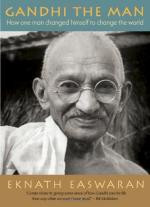
|
| Name: _________________________ | Period: ___________________ |
This test consists of 15 multiple choice questions and 5 short answer questions.
Multiple Choice Questions
1. He was such an irresistible fund-raiser for the oppressed in India that even who gave him money for his cause?
(a) The poor.
(b) The wealthy.
(c) Non-Indians.
(d) Children.
2. The position was as Dada Abdulla's lawyer and a role as what?
(a) Legal assistant in a complicated financial case.
(b) Legal advisor in a complicated financial case.
(c) Legal assistant in a minor financial case.
(d) Legal advisor in a minor financial case.
3. Gandhi coined the word ____________ to describe the Dalits (the oppressed), to call them the children of God, in order to remind the higher classes that their actions toward the oppressed was a part of their worship of God.
(a) Darijan.
(b) Madarijan.
(c) Maharijan.
(d) Harijan.
4. What did Gandhi's uncle suggest he do?
(a) Go to England to study religion.
(b) Go to England to study law.
(c) Go to England to study medicine.
(d) Go to England to find work.
5. Nagler refers to the Berkley documentary called Gandhi's India in which one of the women interviewed praised Gandhi's view as one from which there are no limits to ______________, and Nagler praises the clarity with which Gandhi's life demonstrated the point.
(a) Human strength.
(b) Evil.
(c) Fear.
(d) Human capacity.
6. When the passenger summoned the police, what happened?
(a) They left him alone in his seat.
(b) They left him sitting alone at Maritzburg Station.
(c) They physically moved him to third class.
(d) They arrested him.
7. Part of what made Gandhi so very winsome was what?
(a) His ability to give.
(b) The extravagant life he led.
(c) His kind personality.
(d) The simplicity and poverty in which he continued to voluntarily live.
8. Gandhi determined that the whole British-Indian relationship could be transformed with such an approach of non-violence, or ____________.
(a) Allahisma.
(b) Ahimsa.
(c) Baptisma.
(d) Bahimsa.
9. Finding himself happier and healthier for the change, Gandhi shifted his attention to what?
(a) Studying religion.
(b) His diet.
(c) Understanding British culture.
(d) Looking for a new wife.
10. What did Gandhi call the new form of resistance?
(a) Stand-up.
(b) Sit-down.
(c) Sahara.
(d) Satyagraha.
11. By what year were civil rights written into law?
(a) 1924.
(b) 1904.
(c) 1918.
(d) 1914.
12. Gandhi sulked in his homesickness until when?
(a) A British student pointed out that the thing to be learne in England was English custom.
(b) A British student told him to go back home.
(c) A fellow Indian pointed out that the best things to be learned in England were English customs.
(d) A fellow Indian told him to go back home.
13. When a man does everything in worship, Easwaran explains, everywhere he goes is what?
(a) His family.
(b) His world.
(c) His home.
(d) A temple.
14. Michael N. Nagler of the University of California, Berkley provides the forward for the book, and opens by asking the reader what?
(a) To consider whether Gandhi was a great man.
(b) To consider whether Gandhi helped others.
(c) To consider whether Gandhi is a good example to follow.
(d) To consider whether Gandhi might be the most significant historical figure of the 20th century.
15. He was also confronted with a form of prejudice against him for what reason?
(a) His faith.
(b) His education.
(c) His race.
(d) His accent.
Short Answer Questions
1. How did Gandhi react to this British passenger?
2. Gandhi acted out of compassion for both the British and the Indians for what reason?
3. He made the determination then and there that he would do what?
4. Through a connection of his brother's, Gandhi was given a ____________ contract with a Muslim firm in South Africa to work what he thought would be a clerical position well below the dignity of his education.
5. What does the author say about Gandhi as a boy?
|
This section contains 666 words (approx. 3 pages at 300 words per page) |

|




